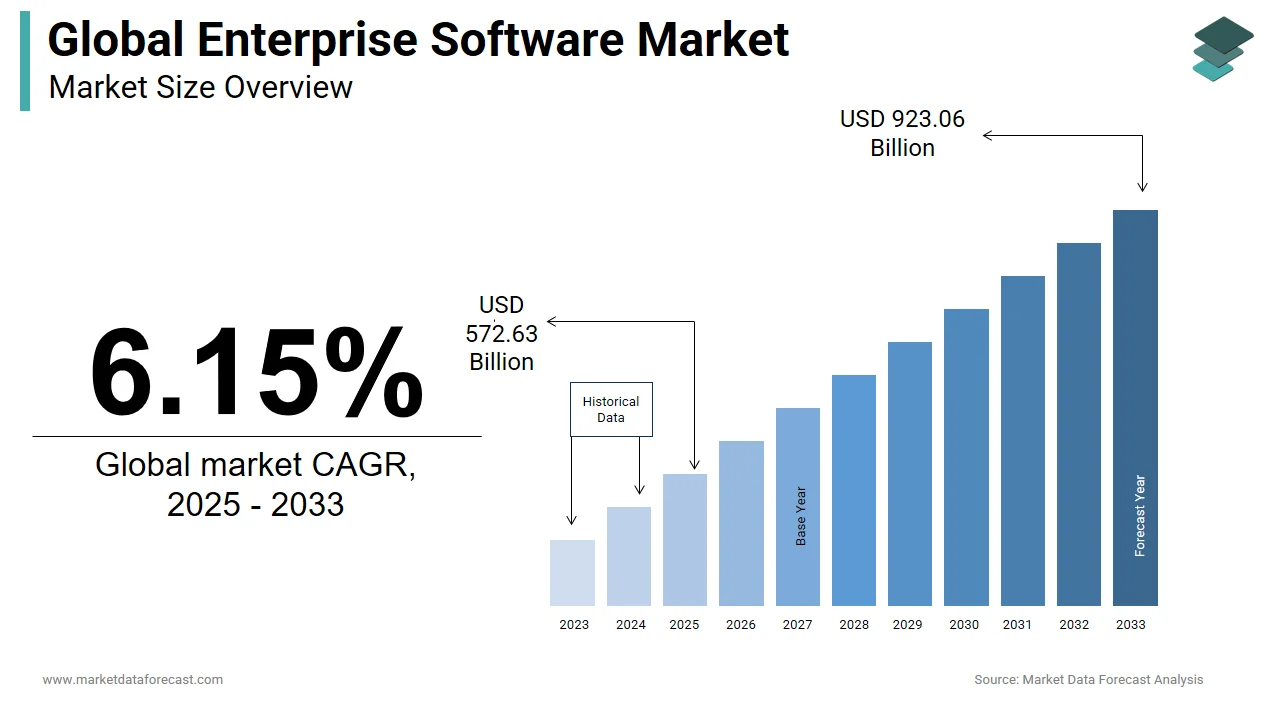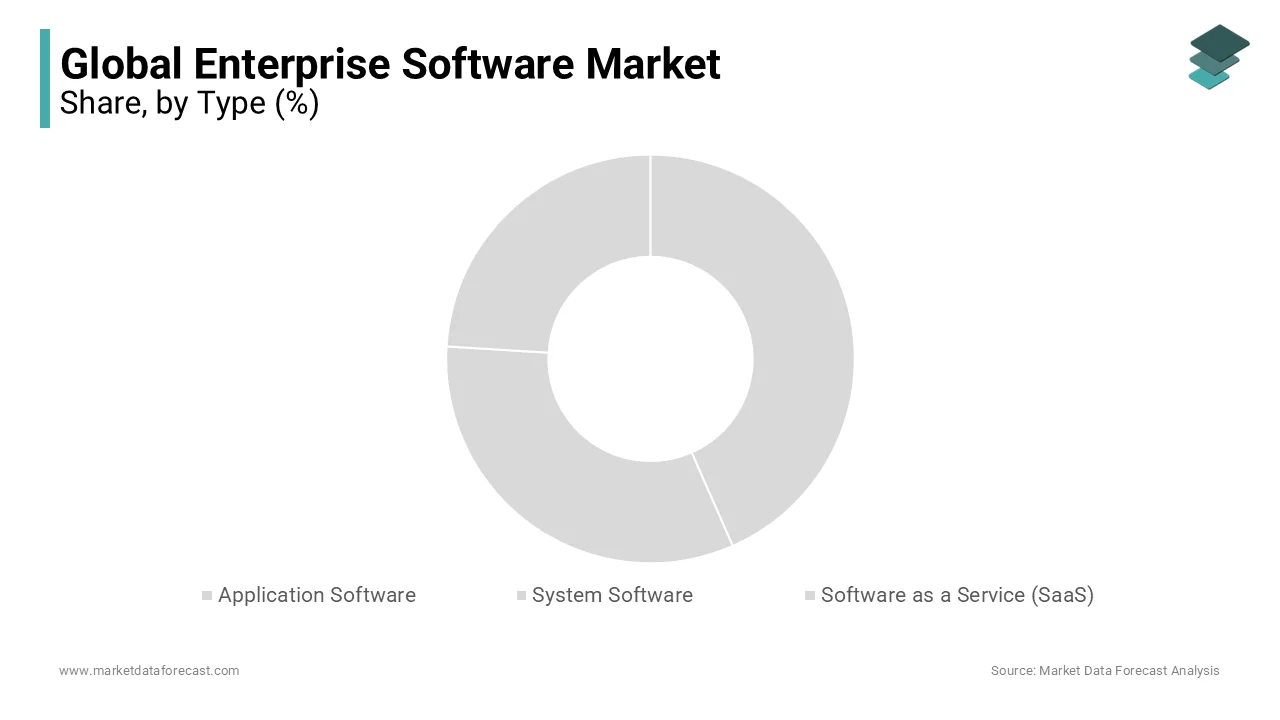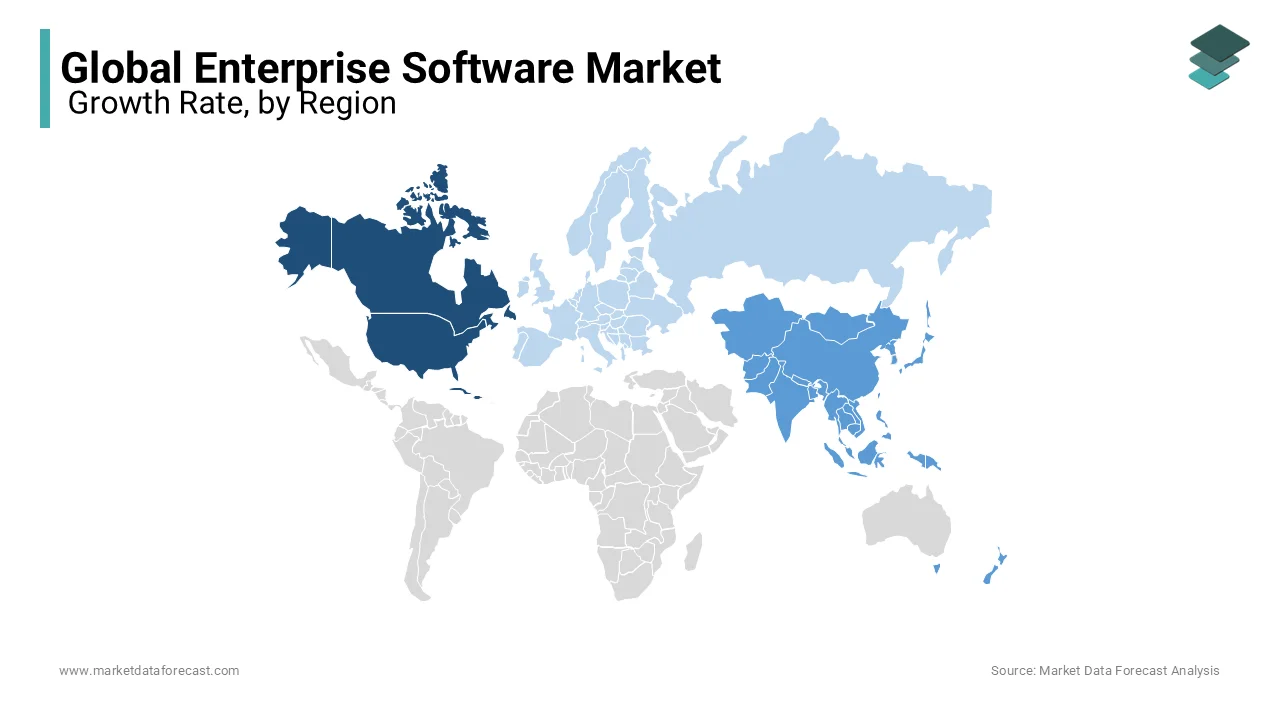Global Enterprise Software Market Size, Share, Trends & Growth Forecast Report - Segmented By Type (Customer Relationship Management (CRM), Enterprise Resource Planning (ERP), Enterprise Software, System Software, Microsoft Windows, Ios, Linux, Application Software, Business Intelligence (BI), And Supply Chain Management (SCM)), Deployment Type (Proprietary Software, Outsourcing Software And Application Service Providers), Application (Supply Chain, Customer Information Management, Sales Accounting, Web Services, Energy Management And Government) & Region - Industry Forecast From 2024 to 2032
Global Enterprise Software Market Size (2024 to 2032)
The size of the global enterprise software market was worth USD 508.20 billion in 2023. The global market is anticipated to reach USD 539.45 billion in 2024 and USD 869.58 billion by 2032, growing at a CAGR of 6.15% during the forecast period.

Enterprise software is increasingly used by organizations across the globe and the various industry verticals for a number of lines of business operations, including but not limited to human resources, business intelligence, manufacturing, planning, sales and service, customer relationship management, inventory and materials management, purchasing, finance, and accounting and marketing. The enterprise software is used to enhance efficiency and productivity to gain a significant competitive advantage.
MARKET DRIVERS
The growing demand for business intelligence and analytics is one of the key factors propelling the growth of the global enterprise software market. Several benefits, such as the increasing use of enterprise software by small, medium, and large organizations in various industry verticals such as manufacturing, healthcare, media and entertainment, public sector, banking and financial services, insurance, telecom, transportation, and energy and utilities, are expected to play an essential role in the growth of the enterprise software market across the globe.
Factors such as the introduction of novel software services and rising awareness regarding enterprise software across the globe will influence the growth of the enterprise software market during the forecast period. Technological innovation and advancement, the rising number of enterprises in the world, and the entry of new industry players are some of the major driving factors that promote the growth of the revenue rate of the enterprise software market during the forecast period.
MARKET RESTRAINTS
The high cost of deployment is one of the important barriers to market growth. Other important deterrents include the drawbacks associated with the software itself, customization and flexibility issues, and the complexities related to migrating existing data.
REPORT COVERAGE
|
REPORT METRIC |
DETAILS |
|
Market Size Available |
2023 to 2032 |
|
Base Year |
2023 |
|
Forecast Period |
2024 to 2032 |
|
CAGR |
6.15% |
|
Segments Covered |
By Type, Deployment Type, Application, and Region |
|
Various Analyses Covered |
Global, Regional & Country Level Analysis, Segment-Level Analysis, DROC, PESTLE Analysis, Porter’s Five Forces Analysis, Competitive Landscape, Analyst Overview on Investment Opportunities |
|
Regions Covered |
North America, Europe, APAC, Latin America, Middle East & Africa |
|
Market Leaders Profiled |
Microsoft Corporation, Infor Inc., Kronos Incorporated, IBM Corporation, SAP AG, Oracle Corporation, and Others. |
SEGMENTAL ANALYSIS
Global Enterprise Software Market Analysis By Type

REGIONAL ANALYSIS

The North American region holds a prominent share of the market since it has been identified as an early adopter of enterprise software, such as software for service and customer relationship management. In contrast, enterprise software penetration rates in this region are high. The adoption of these solutions has become commonplace, with most companies rapidly utilizing hybrid cloud and on-premise product models. Furthermore, the gradual rise in enterprise software adoption in the region, especially in some of the countries such as the US, Canada, and Mexico, propelled the growth of the market. The North American region is expected to hold dominance during the forecast period.
Asia Pacific region is also expected to increase the market growth due to the rising number of enterprises in the world and the entry of new industry players in some of the major economies of the region, such as India, China, and Japan, propel the growth rate of the enterprise software market during the forecast period. Furthermore, the increasing investments by the major key players of the market for R&D activities and for the new advancements in technology are also one of the major driving factors that promote the growth of the revenue rate of the enterprise software market.
The European region will gain good profits from the market, followed by the North American and Asia Pacific regions during the outlook period.
DETAILED SEGMENTATION OF THE GLOBAL ENTERPRISE SOFTWARE MARKET INCLUDED IN THIS REPORT
This global enterprise software market research report has been segmented and sub-segmented based on type, deployment, application, and region.
By Type
-
Application Software
-
Business Intelligence (BI)
-
Supply Chain Management (SCM)
-
Customer Relationship Management (CRM)
-
Enterprise Resource Planning (ERP)
-
-
System Software
-
Microsoft Windows
-
iOS
-
Linux
-
-
Software as a Service (SaaS)
-
Cloud Computing
-
The enterprise resource planning and customer relationship management segments held the prominent share, followed by mobile apps in terms of revenue, and are predicted to remain at the forefront throughout the forecast period.
By Deployment Type
-
Proprietary Software
-
Outsourcing Software
-
Application Service Providers
The proprietary software segment held the largest share of the global market in 2022 and is expected to continue dominating during the forecast period.
By Application
-
Supply Chain
-
Customer Information Management
-
Sales Accounting
-
Web Services
-
Energy Management
-
Government
The customer information management segment held a prominent share of the market among the other segments.
By Region
-
North America
-
Asia Pacific
-
Europe
-
Latin America
-
Middle East and Africa
KEY PLAYERS IN THE GLOBAL ENTERPRISE SOFTWARE MARKET
Microsoft Corporation, Infor Inc., Kronos Incorporated, IBM Corporation, SAP AG, and Oracle Corporation are some of the major companies in the global enterprise software market.
RECENT HAPPENINGS IN THE GLOBAL ENTERPRISE SOFTWARE MARKET
-
IBM partnered with Salesforce in 2018 to integrate their Artificial Intelligence platform and deliver an enhanced customer service experience. Salesforce's in-house platform, Einstein, and IBM’s cognitive computing technology platform, Watson, collaborate to deliver AI-driven recommendations for future actions by the companies.
-
Cohesity company, which was a hyper-converged secondary storage company, has announced that they have raised 250 million US dollars in an oversubscribed series D funding round led by the SoftBank vision fund with strong participation from strategic investors such as Cisco Investments, Hewlett Packard Enterprise, Morgan Stanley Expansion Capital to increase the enterprise software development activities towards achieving the increased operational efficiency and cost reduction.
Frequently Asked Questions
How is the adoption of artificial intelligence (AI) impacting the global enterprise software market?
The adoption of AI is revolutionizing the enterprise software landscape by enabling advanced analytics, automation, and predictive capabilities, thus enhancing productivity and decision-making processes.
What are the most prominent segments within the global enterprise software market?
The major segments within the global enterprise software market include customer relationship management (CRM), enterprise resource planning (ERP), supply chain management (SCM), business intelligence (BI), and collaboration software.
What are the major challenges faced by vendors in the global enterprise software market?
Some of the key challenges include intense market competition, rapid technological advancements necessitating continuous innovation, and the complexity of integrating software across diverse organizational structures and legacy systems.
How are emerging technologies such as blockchain influencing the global enterprise software market?
Emerging technologies like blockchain are being leveraged to enhance transparency, security, and efficiency within enterprise software applications, particularly in areas such as supply chain management, financial transactions, and data management.
Related Reports
Access the study in MULTIPLE FORMATS
Purchase options starting from $ 2500
Didn’t find what you’re looking for?
TALK TO OUR ANALYST TEAM
Need something within your budget?
NO WORRIES! WE GOT YOU COVERED!
Call us on: +1 888 702 9696 (U.S Toll Free)
Write to us: [email protected]